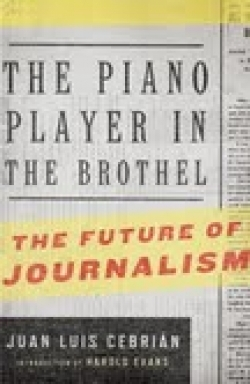The Piano Player in the Brothel
The Future of Journalism
Veteran journalist Juan Luis Cebrián finds his occupation embattled on many fronts: newspapers losing readers to the immediate news available online; the globalizing effects of the world wide web reshaping languages everywhere; plus the advent of one hundred million blogs, with roughly a thousand added each day. What is the role of journalism, and journalists, in a landscape that changes so rapidly? The Piano Player in the Brothel is Cebrián’s answer, a thoughtful collection of essays exploring the storied past and shifting present of reporting, a call to encourage what is best in journalism as we move into the tumultuous era of online news.
Cebrián’s title is taken from a popular joke: one man admits to another that he is a reporter, but pleads “Don’t tell my mother I’m a journalist. She thinks I play piano at the whorehouse.” A comment on the fluid state of journalism, at times contemptible, other times noble, always changing in relation to the people it serves. No one knows this better than Cebrián. After starting his career under the Franco regime and becoming the director of El Pais, Spain’s largest newspaper, Cebrián is an authority on the democratizing effects of an open press.
The author uses this first-hand knowledge to color his essays, mapping the historically tenuous relationship between journalist, government, and reader. He visits America for his example of maintaining journalistic integrity, noting, “Watergate was a reminder of journalism’s role as a watchdog against corruption and has come to symbolize journalistic independence, a check against political power.” He describes the difficulty of telling the truth under the Franco regime, where journalists were routinely bullied by the government’s Press Agency. Cebrián’s analysis of the role of journalism in the war on terror is nuanced and thoughtful: he applauds the media’s show of respect by not displaying the bodies of victims on television, but finds reprehensible the large television networks’ manipulation of viewers while covering the Iraq War.
Some of the most salient questions in modern journalism are raised in this collection. What is the role of traditional journalism in a world of blogs? Can a society retain its unique culture in the face of the globalizing behemoth of the Internet? Is it possible for newspapers to maintain their independence while experiencing shrinking profits and massive budget cuts? These questions have stumped journalists across the globe, and Cebrián does not have the answers. But he believes the solutions may be found once the questions are brought forward and discussed. “That is what I have attempted to do with these essays: to destroy myths, to provoke discussion fit for whorehouses,” Cebrián writes. “Maybe this is the secret to survival in the digital revolution.” This collection is sure to do just that, educating the reader of journalism’s past while reminding him of the qualities found in the best reporting, those that are needed more than ever in the digital future.
Reviewed by
Michael Beeman
Disclosure: This article is not an endorsement, but a review. The publisher of this book provided free copies of the book to have their book reviewed by a professional reviewer. No fee was paid by the publisher for this review. Foreword Reviews only recommends books that we love. Foreword Magazine, Inc. is disclosing this in accordance with the Federal Trade Commission’s 16 CFR, Part 255.

